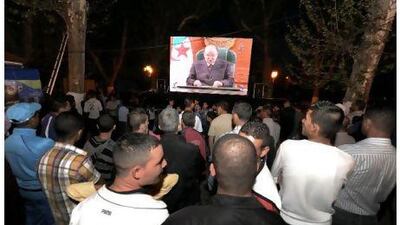Algiers // Algeria's president, Abdelaziz Bouteflika, yesterday promised constitutional reform and accelerated economic development. It was the second time this year that the Algerian leader promised reforms amid ongoing social and political unrest at home and in the region.
Most of the speech delivered on television was devoted to listing the government's achievements but Mr Bouteflika did acknowledge that more needed to be done. "I am not saying that everything is good. Problems such as cronyism and corruption exist and need to be tackled."
Mr Bouteflika said the reforms should be adopted before nationwide elections due in May next year.
He said that he would seek revisions of the constitution to encourage better governance, democracy and transparency by asking a new panel of members of recognised political parties and experts in constitutional law to come up with proposals that would be submitted to parliament or a referendum. A "thorough overhaul" of the electoral law will also allow Algerians to "use their right in the best democratic and transparent conditions", he said. Political parties, regardless of whether they are represented in parliament or not, will take part in the process, he added. Mr Bouteflika said the media law would be changed but did not mention opening up radio and television networks to the private sector. His remarks echoed a speech that was delivered in his name in March, although this was the first time since the unrest began that he directly addressed the nation.
Small-scale protests by several professional and political groups have continued in Algeria since at least two people were killed in riots over food prices in January. The government has responded to the unrest with a mix of economic and political concessions of which the most notable was the lifting of the almost two decade-old state of emergency in February.
But the government did maintain a ban on demonstrations in the capital, Algiers, ostensibly for security reasons. That ban was challenged last week when thousands of students marched on the presidential palace with a mix of university related and political demands.
The government's critics dismissed Friday's speech as insignificant. "Bouteflika violated the constitution 24 times in his 12 years in office. So what difference will it make whether he changes it or not," said author and journalist Adlène Meddi.
But government supporters said that the speech showed serious desire on the part of the president to introduce meaningful reform. "We are particularly pleased with the emphasis on strengthening the democratic process. We will help him in the national assembly," said Seddik Chihheb, vice president of the national assembly and a senior official in the governing coalition's RND party.
Many Algerians have shown themselves wary about the government's promises though and the speech may not have the intended impact of calming the situation. Mounir Boudjemma, a senior editor at the independent daily Liberté, said, "for some the glass will be half empty, for others half full. If the reforms get underway and the promises in the speech are going to be kept, that could mean a significant step towards real participatory democracy."
But others, such as Mr Meddi, remain sceptical and suspect Mr Bouteflika of just trying to buy time. "He wants to avoid the scenario of Laurent Gbagbo or Mubarak," said Mr Meddi, referring to the former presidents of Ivory Coast and Egypt.
foreign.desk@thenational.ae with additional reporting by Agence France-Presse

